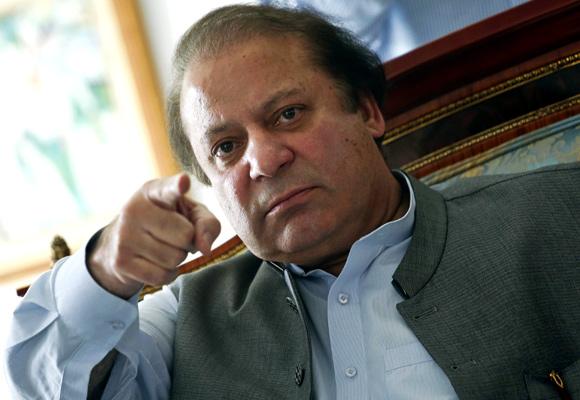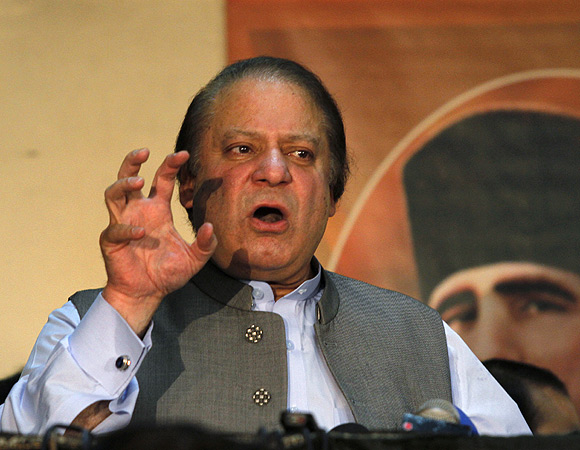Photographs: Damir Sagolj/Reuters
After years in oblivion, Nawaz Sharif, who is known as the 'Lion of Punjab', is back on the throne for the record third term as the prime minister.
As Pakistan finds itself besieged by problems ranging from terrorism to severe power shortage, many see him as someone who can fix the country's bleeding economy but is soft on the Taliban.
Only time will tell if the 'lion' can indeed roar again and keep his complex country on track.
A steel-tycoon-cum-politician, Sharif, 63, has made an astounding comeback after being toppled in a 1999 coup. He was jailed and exiled to spend seven years in wilderness.
Following the May 11 historic general elections, Sharif's centre-right Pakistan Muslim League-Nawaz had emerged as the single largest party, falling just short of a majority.
But he was able to muster the required strength within days as many independents came forward to support him.
Sharif promised to transform the country's economy, end corruption in state-owned enterprises, build a motorway from Lahore to Karachi and launch a bullet train.
Click on NEXT for more...
Nawaz Sharif scripts history
Photographs: Mohsin Raza/Reuters
He had also stressed on talks with Taliban, but his plans seem to have been hit severely after a United States drone strike killed Pakistani Taliban's deputy chief Waliur Rahman.
The Taliban has now threatened retaliatory attacks.
Sharif's last term as prime minister ended in 1999 when then army chief Pervez Musharraf carried out a bloodless coup.
In a dramatic fall from grace, Sharif ended up in jail, convicted of hijacking charges for trying to stop a plane carrying Musharraf from landing.
He then went into exile in Saudi Arabia and didn't return to Pakistan until 2007, when he teamed up with the Pakistan Peoples Party to oust Musharraf from office.
Incidentally, his bete-noire Musharraf, who came back from self-imposed exile to contest in the polls, is in jail following a battery of charges against him.
During his campaigning, Sharif has emphasised on the need to restart the peace process with India.
"We will have to pick up the thread from where we left in 1999. That was a historic moment and I would like to tread that path...We all agreed that we will have to solve, we will solve all the problems through peaceful means, sitting across the table," Sharif had said.
"We got to bring that time back again and restart our journey from that point," he had said.
Click on NEXT for more...
Nawaz Sharif scripts history
Photographs: Mohsin Raza/Reuters
While India has welcomed his statements and has also reciprocated positively, New Delhi has adopted a wait-and-watch approach.
Meanwhile, Sharif's campaign has focused a lot on the economy.
Pakistan ranks 146th out of 186 countries in the United Nations' human development index, a measure of living standards, health and education.
Under the slogan 'Strong Economy -- Strong Pakistan', Sharif seems to have successfully projected his image as a flag-bearer for private industry and entrepreneurship. Sharif had taken steps to liberalise the economy during his time in office in the 1990s.
Though his economic credentials seem to be fine, he is seen as someone who is soft on the Pakistani Taliban, after his calls for talks with the outfit rather than a military onslaught against it.
Sharif was born in 1949 into a wealthy family of industrialists in Lahore and was educated privately at English-language schools.
He got a degree in law from the University of Punjab before joining his father's steel company and eventually entering politics, after his family was hit considerably following
the nationalising of nationalise private industries in the 1970s by then Prime Minister Zulfikar Ali Bhutto.
Under the patronage of former military ruler Zia-ul Haq, Sharif initially became a finance minister and then the chief minister of Punjab -- a post he held for five years from 1985 until he was elected prime minister in 1990.
He served a three-year term until he was sacked on corruption charges and replaced by his arch-rival Benazir Bhutto.
Click on NEXT for more...




article